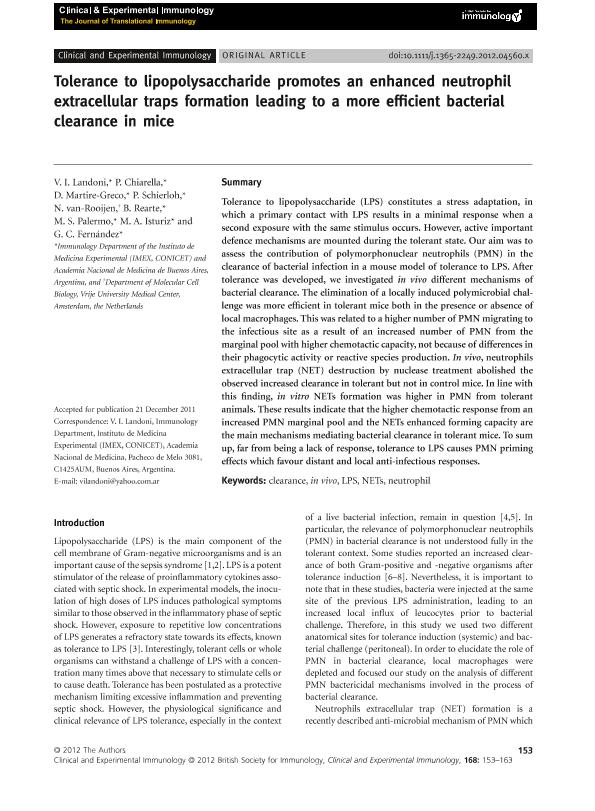Artículo
Tolerance to lipopolysaccharide promotes an enhanced neutrophil extracellular traps formation leading to a more efficient bacterial clearance in mice
Landoni, Verónica Inés ; Chiarella, Paula
; Chiarella, Paula ; Martire Greco, Daiana
; Martire Greco, Daiana ; Schierloh, Luis Pablo
; Schierloh, Luis Pablo ; van Rooijen, N.; Rearte, María Bárbara
; van Rooijen, N.; Rearte, María Bárbara ; Palermo, Marina Sandra
; Palermo, Marina Sandra ; Isturiz, Martín Amadeo
; Isturiz, Martín Amadeo ; Fernández, Gabriela Cristina
; Fernández, Gabriela Cristina
 ; Chiarella, Paula
; Chiarella, Paula ; Martire Greco, Daiana
; Martire Greco, Daiana ; Schierloh, Luis Pablo
; Schierloh, Luis Pablo ; van Rooijen, N.; Rearte, María Bárbara
; van Rooijen, N.; Rearte, María Bárbara ; Palermo, Marina Sandra
; Palermo, Marina Sandra ; Isturiz, Martín Amadeo
; Isturiz, Martín Amadeo ; Fernández, Gabriela Cristina
; Fernández, Gabriela Cristina
Fecha de publicación:
04/2012
Editorial:
Wiley Blackwell Publishing, Inc
Revista:
Clinical and Experimental Immunology
ISSN:
0009-9104
Idioma:
Inglés
Tipo de recurso:
Artículo publicado
Clasificación temática:
Resumen
Tolerance to lipopolysaccharide (LPS) constitutes a stress adaptation, in which a primary contact with LPS results in a minimal response when a second exposure with the same stimulus occurs. However, active important defence mechanisms are mounted during the tolerant state. Our aim was to assess the contribution of polymorphonuclear neutrophils (PMN) in the clearance of bacterial infection in a mouse model of tolerance to LPS. After tolerance was developed, we investigated in vivo different mechanisms of bacterial clearance. The elimination of a locally induced polymicrobial challenge was more efficient in tolerant mice both in the presence or absence of local macrophages. This was related to a higher number of PMN migrating to the infectious site as a result of an increased number of PMN from the marginal pool with higher chemotactic capacity, not because of differences in their phagocytic activity or reactive species production. In vivo, neutrophils extracellular trap (NET) destruction by nuclease treatment abolished the observed increased clearance in tolerant but not in control mice. In line with this finding, in vitro NETs formation was higher in PMN from tolerant animals. These results indicate that the higher chemotactic response from an increased PMN marginal pool and the NETs enhanced forming capacity are the main mechanisms mediating bacterial clearance in tolerant mice. To sum up, far from being a lack of response, tolerance to LPS causes PMN priming effects which favour distant and local anti-infectious responses.
Palabras clave:
CLEARANCE
,
IN VIVO
,
LPS
,
NETS
,
NEUTROPHIL
Archivos asociados
Licencia
Identificadores
Colecciones
Articulos(IMEX)
Articulos de INST.DE MEDICINA EXPERIMENTAL
Articulos de INST.DE MEDICINA EXPERIMENTAL
Citación
Landoni, Verónica Inés; Chiarella, Paula; Martire Greco, Daiana; Schierloh, Luis Pablo; van Rooijen, N.; et al.; Tolerance to lipopolysaccharide promotes an enhanced neutrophil extracellular traps formation leading to a more efficient bacterial clearance in mice; Wiley Blackwell Publishing, Inc; Clinical and Experimental Immunology; 168; 1; 4-2012; 153-163
Compartir
Altmétricas



